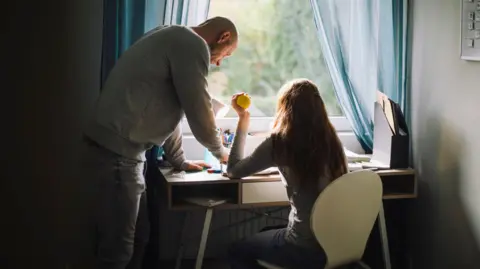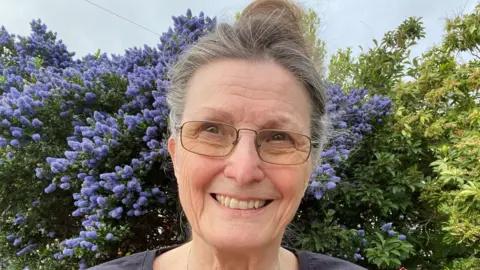Why are more children being home educated?
 Getty Images
Getty ImagesThe number of children being home educated in the South East has risen sharply, a BBC investigation has found.
A total of 11,541 children were being educated at home in April compared with 6,435 in 2020.
Some parents told BBC South East that schools couldn't cater for their children's special educational needs.
The Association of Directors of Children's Services (ADCS) says school dissatisfaction and mental and emotional health issues are reasons given by families.
 Kellie Milano
Kellie MilanoKellie Milano, who home educates her 13 year-old autistic daughter, said: "She was anxious going into school, she didn't want to be there.
"She didn't feel she was listened to, but couldn't communicate what was wrong.
"I would end up with a little girl in the back of the car crying," she said.
"I was forcing her to go into school, but actually that wasn't the right thing to do, she was masking in school, and that was doing more damage than anything."
Kellie, who started Club Ausome in Rochester to support other families, says a growing number of parents are now teaching their children at home
She said: "Numbers are massively increasing, there are always parents discussing the options of home educating."
'Seems pretty normal'
Government data from the education census in Autumn 2023 shows that whilst the biggest known reason for moving to elective home education remained philosophical (16% of the total), mental health came a close second (13%)
Experts also believe behaviour issues after the pandemic have made school a difficult place to be for some pupils.
Leanne, from Sussex, has been educating her teenage son, who has autism, for over three years.
She said: "He wasn't able to go to school - the noises, the smells, it was too much for him. The school did their bit, but they couldn't do any more.
"His sensory got worse, he didn't want people to see his rituals."
Leanne says she is aware of more families opting to remove their children from school.
"Some schools are incredible at the special needs schools, but there are not enough teaching assistants in schools, there is a lot of pressure," she said.
"Whereas before it was a bit of a stigma, now it seems pretty normal.
"When I first home educated people were shocked, but now I know so many parents are doing it, just in my local area."
 Wendy Charles-Warner
Wendy Charles-WarnerThe national charity Education Otherwise said it was also aware of more families who felt their children's special educational needs were not being met in school.
Its chair, Wendy Charles-Warner, said: "They feel that they have no choice. For many of those it's mental health needs often connected to special needs."
The Association of Directors of Children's Services is calling for a national register of children being educated other than at school.
Government plans for a register of out-of-school children were put on hold when the Schools Bill was scrapped in 2022.
There is still no obligation for parents to notify councils if they choose to home educate their children.
'Vulnerable to harm'
Heather Sandy, Chair of the ADCS' Education Policy Committee said:
"Whilst a register in and of itself will not keep children safe, it will help to establish exactly how many children are being educated other than at school and assist with the identification of children who may be vulnerable to harm."
But Wendy Charles-Warner said a register that feels punitive to parents will always meet with resistance and that resistance will mean fewer children are supported.
"Most parents are doing a good job, or a good enough job of home education.
"That tiny few who need support, and who are not receiving the sort of education they should be receiving, will actually be lost if we're not careful."
A Conservative Party spokesman said: "English children are now the best readers in the Western world, and we have risen up the international rankings to 11th in the world for maths. We support the right of parents to choose to education their children at home, many of whom do so very well.”
Labour said an "urgent priority" would be a new register of children not in school, access to mental health counselling support in every school paid for by ending private schools’ tax breaks, and free breakfast clubs available to every primary school pupil to drive attendance as well as attainment.
The Liberal Democrats are calling for a dedicated, qualified mental health professional in every primary and secondary school to make sure children and parents have someone to turn to when they need help.
A Green Party spokesperson said: "Green policy does not support an additional national register just for parents who home school. Any interactions between national and local authorities and home educators should empower and assist families and be supportive, rather than invasive."
Reform UK has been approached for a comment.
Follow BBC Sussex on Facebook, on X, and on Instagram. Send your story ideas to [email protected] or WhatsApp us on 08081 002250.
